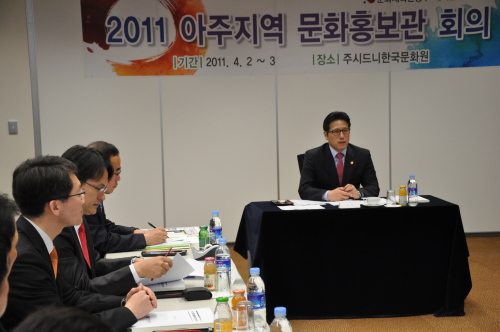SYDNEY ― Korean Culture and Information Service’s Korean culture centers promoting Korean studies, culture and arts around the world need to know exactly what kind of information and content local visitors want, Culture Minister Choung Byoung-gug said in a meeting with Korean cultural center heads in Sydney, Australia.
His comments came as directors of Korean cultural centers and culture & press consuls of Korean embassies and consulates in Asia gathered in the city’s new Korean cultural center to discuss ways to better promote Korea’s image and culture in the Asian region on the weekend.
“Korean cultural centers need to check what kind of data local visitors really want and need when they come to the centers and analyze them in various categories,” Choung said Saturday. He is leading a South Korean delegation of government officials, politicians and artists to take part in celebrating the 50th anniversary of diplomatic ties between Korea and Australia and opening the Korean Cultural Center in Sydney on Monday.
 |
Culture Minister Choung Byoung-gug (right) speaks at a meeting with directors of Korean cultural centers and culture and press consuls of Korean embassies and consulates in Asia in Sydney on Saturday. (KOCIS) |
“When I visited some Korean cultural centers as a lawmaker, it came to my attention that they rarely updated their database and didn’t seem to even care whether the database was being updated or not. I will put data updating results in evaluating your performances,” said Choung, who was a three-term lawmaker with the Grand National Party until he took office as Culture Minister in February.
Choung agreed with Kim Young-soo, director of the Korean Culture Center in Sydney, who suggested the KOCIS, affiliated with Ministry of Culture, Sports and Tourism, collect all kinds of Korean content from all Korean cultural centers around the world and provide each Korean culture center with customized content.
Choung also urged Korean cultural centers to create synergy effects in promoting Korean culture by working with other culture-related state-run agencies, including overseas branches of the Korea Tourism Organization and the Korea Creative Content Agency.
“For example, an integrated Korea Center can provide a movie theater, a Korean restaurant, a hair shop, a DVD/CD shop of Korean content. But a KOCIS office, a KTO office and a KCCA office should not be separately installed in the same building,”
The KOCIS plans to newly open seven more cultural centers overseas this year, in addition to the latest one in Sydney. The centers will be located in the Philippines, Indonesia, Spain, India, Mexico, Turkey and Hungary.
Korea’s cultural centers hold cultural events such as film festivals, exhibitions and concerts and invite local people to learn Korean.
Seo Kang-soo, director of the KOCIS, said Korean cultural centers will conduct surveys of young people in each region to assess the local interest in Korean culture.
“Please do away with the seriousness and the boring color of government. Instead, try to attract local passersby to drop by the Korean cultural center just because they were intrigued by something at the center,” Choung said.
Kim Ik-kyum, director of the Korean Cultural Center in China, suggested Korean cultural centers give a standardized certificate of Korean language proficiency to Korean language learners so that they can use it when applying for other education programs or finding a job.
By Kim Yoon-mi, Korea Herald correspondent (
yoonmi@heraldcorp.com)








![[Today’s K-pop] Blackpink’s Jennie, Lisa invited to Coachella as solo acts](http://res.heraldm.com/phpwas/restmb_idxmake.php?idx=644&simg=/content/image/2024/11/21/20241121050099_0.jpg)